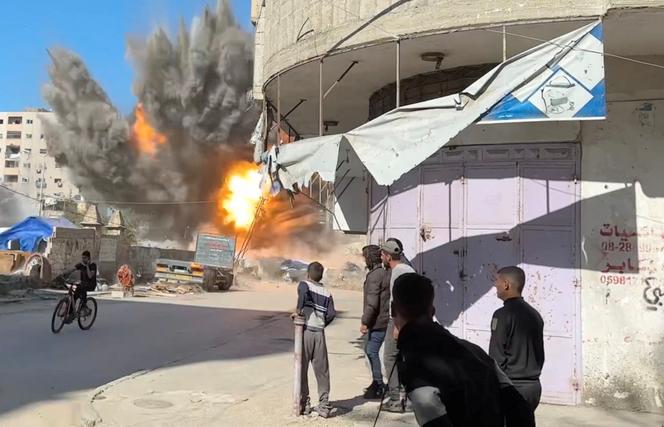


Israel's military pressed ground operations across the Gaza Strip on Sunday, March 23, encircling part of Rafah city, located on the border with Egypt, almost a week into a renewed assault on the Palestinian territory. Rafah, in southern Gaza, had already been the target of a major Israeli offensive about a year ago.
Israeli troops have "in recent hours" encircled Tal al-Sultan in Rafah, the military said in a statement, adding its objective was to "dismantle terrorist infrastructure and eliminate" militants there. Earlier on Sunday, Israel had warned residents of the area to evacuate.
On Tuesday, Israel also restarted intense air strikes across the territory. According to the Gaza health ministry, at least 637 Palestinians have been killed in the renewed Israeli assault since Tuesday.
Three weeks ago Israel blocked the entry of humanitarian aid into Gaza and cut electricity, in a bid to force Hamas to accept the Israeli terms for an extension of the ceasefire and release the 58 hostages still held by Palestinian militants.
With fuel unable to enter the territory, Agence France-Presse (AFP) images showed Gazans collecting books from the bombed-out Islamic University in Gaza City to use for cooking fires.
On Friday, Israeli Defense Minister Israel Katz said he had ordered the army to "seize more territory in Gaza," warning Israel could annex it if Hamas failed to heed Israel's demands for the next steps in the truce process.
The comments prompted France to say it opposed "any form of annexation," while France, Britain and Germany jointly said the resumption of Israeli strikes was "a dramatic step backward."
The European Union's foreign policy chief Kaja Kallas will be in Israel and the occupied West Bank on Monday to press for "an immediate return to the full implementation of the ceasefire-hostage release agreement," her diplomatic service said.
The deployment of Israeli troops in parts of Gaza came despite calls to revive a January truce with Hamas militants. Hamas has accused Israel of sacrificing the hostages with its resumption of bombardments. Many families of the captives have called for a renewed ceasefire, noting that most of those returned alive were freed during truce periods.
The Israeli military also announced on Sunday that it was conducting operations in Beit Hanun, northern Gaza, where "fighter jets struck several Hamas targets."
Meanwhile, an Israeli strike on a tent encampment in Al-Mawasi, in the Khan Yunis area, killed senior Hamas official Salah al-Bardawil and his wife, the Islamist movement said in a statement on Sunday. Bardawil is the third member of Hamas's political bureau killed in the renewed Israeli strikes.
Israel's military confirmed it had targeted Bardawil, who had "directed the strategic and military planning" of Hamas in Gaza. His "elimination further degrades Hamas's military and government capabilities," it added.
The escalation in Gaza has coincided with waves of Israeli air strikes on Lebanon and missiles fired from Yemen. Israel's military on Sunday said it had "attacked and eliminated" a Hezbollah member "in the area of Aita al-Shaab," in southern Lebanon.
The strike came a day after a new escalation in the Israel-Hezbollah war since a November ceasefire was broken. Lebanon's health ministry said seven people were killed on Saturday.
Israel said it attacked in response to rocket fire, which Iran-backed Hezbollah – an ally of Hamas – has denied responsibility for.
Since Tuesday, Yemen's Houthi rebels have also launched missiles at Israel. Early Sunday, Israel said it had intercepted another missile from Yemen, where the Iran-backed Houthis say they are acting in solidarity with Palestinians.
